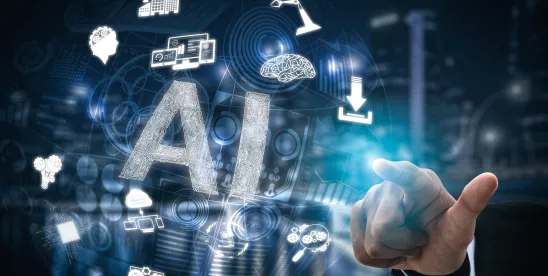As we have previously reported about (here and here), 2024 has been a historic year in the United States for state legislation aimed at protecting employees from harm arising out of the use of artificial intelligence (“AI”) systems. In May, Colorado passed the first US law addressing algorithmic discrimination in private sector use of AI systems, imposing obligations on Colorado employers such as disclosing their use of AI to employees and applicants. Last week, Illinois joined the ranks, imposing new obligations on Illinois employers that use AI systems to make, or that are used to aid in making, employment decisions.
Illinois HB 3773: What Employers Need to Know
On August 9, Illinois Governor J.B. Pritzker signed into law several AI-related bills, including HB 3773 (“HB 3773” or the “Act”), which amends the Illinois Human Rights Act to protect employees against discrimination from, and require transparency about, the use of AI in employment-related decisions. (The other bills address non-employment related issues arising from the use of AI.)
Under HB 3773, an employer cannot use AI that has the effect of subjecting employees to discrimination based on a protected class with respect to, e.g., recruitment, hiring, promotion, discharge, discipline, or the terms, privileges, or conditions of employment. In addition, the Act prohibits employers from using zip codes as a proxy for protected classes. Illinois employers must notify employees of the use of AI to make or aid in making employment-related decisions. HB 3773 applies to any person employing one or more employees within Illinois.
The Act defines “artificial intelligence” as a machine-based system that, for explicit or implicit objectives, infers, from the input it receives, how to generate outputs such as predictions, recommendations, or decisions that can influence physical or virtual environments. “Artificial intelligence” is also defined to include “generative artificial intelligence,” meaning an automated computing system that, when prompted with human input, can produce outputs that simulate human-produced content such as essays, images, or video.
As with other allegations of employment-related civil rights violations, an employee alleging a violation of the AI provisions in HB 3773 must first file a complaint with the Illinois Department of Human Rights (the “IDHR”). Within 100 days of the filing of the charge, the IDHR will determine if there is substantial evidence to support that the alleged civil rights violation occurred. If not, the charge will be dismissed, but the aggrieved party can seek review of the dismissal before the Illinois Human Rights Commission (the “Commission”). The IDHR must file a complaint with the Commission when it determines there is substantial evidence that the alleged violation occurred. When a complaint is filed with the Commission, any party may elect to have the claim decided in an Illinois circuit court within 20 days after receiving service of the complaint. Available remedies include actual damages, civil penalties ranging from $16,000 to $70,000, attorneys’ fees, compliance reporting obligations, and any other action as may be necessary to make the complainant whole.
How Does HB 3773 Differ From Colorado’s Artificial Intelligence Act?
Colorado’s Artificial Intelligence Act (“CAIA”), structured more as a consumer-protection law, imposes a duty of care on creators and deployers of high-risk AI systems to protect consumers from any known or reasonably foreseeable risks of algorithmic discrimination. CAIA does not exclusively regulate employers. Rather, high-risk AI systems include AI systems that make, or assist in making, employment-related decisions. Under CAIA, Colorado employers also must complete annual impact assessments, provide various notices to employees, and implement a risk-management policy and program. Substantially similar to CAIA is HB 5322, a pending Illinois bill that includes affirmative reporting obligations and annual assessments for “deployers” of AI systems, which includes, but is not limited to, employers.
By contrast, HB 3773 amends Illinois’ Human Rights Act to make algorithmic discrimination an actionable civil rights violation. In other words, HB 3773 allows Illinois employees to seek relief under the state’s Human Rights Act for discrimination arising from their employer’s use of an AI system. Unlike Colorado’s CAIA, the Act does not require affirmative action from an employer to assess, report, or mitigate the risks arising from the use of AI systems.
As we previously reported, legislation aimed at addressing algorithmic discrimination is pending in multiple states and there are indications that issues arising from the use of AI systems also are being considered at the federal level.
Colorado and Illinois are currently the only US jurisdictions that regulate an employer’s use of AI systems. However, all US employers should take note of how regulation at the federal level and at the state level could impact their use of an AI system.




 />i
/>i


